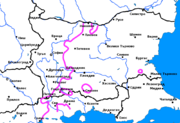
Moesian dialects
Encyclopedia

Bulgarian language
Bulgarian is an Indo-European language, a member of the Slavic linguistic group.Bulgarian, along with the closely related Macedonian language, demonstrates several linguistic characteristics that set it apart from all other Slavic languages such as the elimination of case declension, the...
, part of the Eastern Bulgarian dialects. The Moesian dialects are spoken in northeastern Bulgaria and in the regions of Karnobat
Karnobat
Karnobat is a town in the Burgas Province, Southeastern Bulgaria. It is the administrative centre of the homonymous Karnobat Municipality. As of December 2009, the town has a population of 18,480 inhabitants.-Geography:...
, Aytos
Aytos
Aytos , sometimes written Aitos and Ajtos, is a town located in eastern Bulgaria some 30 kilometers from the Bulgarian Black Sea Coast and belonging to the administrative boundaries of Burgas Province. It is the administrative centre of the homonymous Aytos Municipality...
, Burgas
Burgas
-History:During the rule of the Ancient Romans, near Burgas, Debeltum was established as a military colony for veterans by Vespasian. In the Middle Ages, a small fortress called Pyrgos was erected where Burgas is today and was most probably used as a watchtower...
and Yambol
Yambol
Yambol is a city in southeastern Bulgaria, an administrative centre of Yambol Province. It lies on both banks of the Tundzha river in the historical region of Thrace. As of February 2011, the town has a population of 72,843 inhabitants. It is occasionally spelt 'Jambol'.The administrative centres...
in southern Bulgaria. However, due to the mass population movements that affected eastern Bulgaria during the 19th and the beginning of the 20th century, nowadays, there are very few areas where only Moesian is spoken. In most areas, and especially in southern Bulgaria and Dobruja
Dobruja
Dobruja is a historical region shared by Bulgaria and Romania, located between the lower Danube river and the Black Sea, including the Danube Delta, Romanian coast and the northernmost part of the Bulgarian coast...
, Moesian speakers are mixed with speakers speaking Balkan dialects
Balkan dialects
The Balkan dialects are the most extensive group of dialects of the Bulgarian language, covering almost half of the present-day territory of Bulgaria and slightly less than a third of the territory on the Balkans where Bulgarian is spoken. Their range includes north-central Bulgaria and most of the...
. As a result of this and also due to the influence of the literary language, most features of the Moesian dialects have given way to features typical for the Balkan dialects
Balkan dialects
The Balkan dialects are the most extensive group of dialects of the Bulgarian language, covering almost half of the present-day territory of Bulgaria and slightly less than a third of the territory on the Balkans where Bulgarian is spoken. Their range includes north-central Bulgaria and most of the...
.
Phonological and morphological characteristics

- Vowel change я/broad е (ʲa/æ) instead of formal Bulgarian я/е (ʲa/ɛ) for Old Church Slavonic – (бял/бæли instead of бял/бели). As a result of the influence of the Balkan dialectsBalkan dialectsThe Balkan dialects are the most extensive group of dialects of the Bulgarian language, covering almost half of the present-day territory of Bulgaria and slightly less than a third of the territory on the Balkans where Bulgarian is spoken. Their range includes north-central Bulgaria and most of the...
, the broad e (æ) has now been almost universally replaced by (ɛ) - щ/жд (ʃt/ʒd) for Proto-Slavic *tʲ/*dʲ (as in Standard Bulgarian) - нощ, между (night, between)
- Universal loss of x /x/ and ф /f/. The two consonants are either completely lost or replaced by v or u
- The masculine definite article is о (stressed) and у (unstressed) instead of formal Bulgarian –ът/ъ (гърˈбо, ˈстолу instead of гърˈбът, ˈстолът). As a result of the influence of the Balkan dialectsBalkan dialectsThe Balkan dialects are the most extensive group of dialects of the Bulgarian language, covering almost half of the present-day territory of Bulgaria and slightly less than a third of the territory on the Balkans where Bulgarian is spoken. Their range includes north-central Bulgaria and most of the...
, the о/у definite article has largely been replaced by –ът/ъ - ending e instead of formal Bulgarian i for multi-syllable masculine nouns (българе instead of българи)
- ending e instead of formal Bulgarian i for plural past active aorist participles (биле instead of били)
- Preposition у instead of formal Bulgarian в (у Русе instead of в Русе)

